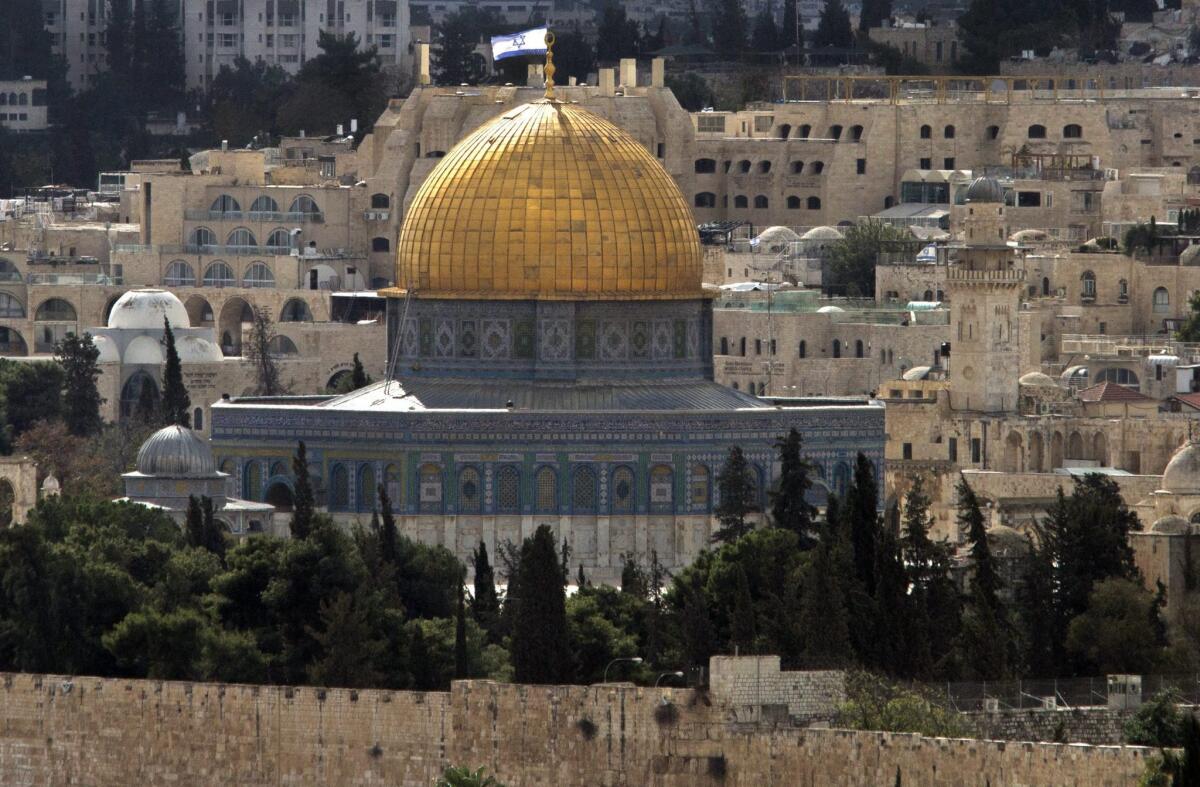Jerusalem remains tense as Netanyahu calls for restraint

- Share via
Reporting from Jerusalem — Rainy days in Jerusalem haven’t doused the heightened emotions that continue to flare around the contested city, where the Temple Mount has been reopened to visitors but restrictions remain imposed on Muslim worship and leaders strain to keep a lid on unrest.
In a bid to calm the volatile air after several days of violence focused around the sensitive site, Israeli Prime Minister Benjamin Netanyahu called on both Israeli and Palestinian officials to act with restraint.
“The Temple Mount is the most sensitive kilometer on Earth,” Netanyahu told his cabinet Sunday, cautioning that “it is easy to start a religious fire but much more difficult to extinguish it.”
The site in Jerusalem’s Old City is holy ground to Muslims, Jews and Christians alike. Muslims and Jews in particular have long engaged in a tug-of-war over access.
Palestinian Authority’s Mahmoud Abbas welcomed Netanyahu’s call but angered Israel anew with a condolence letter to the family of Muataz Hijazi, a Palestinian from Jerusalem who was a suspect in the shooting of Yehuda Glick, a Jewish Temple Mount ideologue. Glick was shot and wounded on Wednesday night; Hijazi was fatally shot the next day by Israeli police.
According to Israeli media, Abbas decried Hijazi’s death as a “heinous crime committed by the murderous terrorist gangs in the Israeli occupation army.”
In an issued statement, Netanyahu condemned Abbas’ sympathy toward “one who tried to perpetrate a reprehensible murder” while efforts were being made to calm the situation. He urged the international community to condemn Abbas for such actions.
Justice Minister Tzipi Livni called Abbas’ text “both outrageous and dangerous,” and said the Palestinian leader who repeatedly denounces violence was encouraging it at the same time. Abbas is “riding a tiger and will lose control,” Livni cautioned in an interview Monday.
However, she had words for Israeli policymakers as well. Attempts to change the status quo in Jerusalem, including Jewish families moving into the Palestinian neighborhood of Silwan by night, might turn Israel’s conflict with the Palestinians into “a comprehensive conflict with the Arab world,” including Jordan and Egypt, Israel’s peace-treaty allies, she warned.
Livni, Israel’s head negotiator to talks with the Palestinians, called for renewed diplomatic efforts. Her Palestinian counterpart, chief negotiator Saeb Erekat, was scheduled to meet in Washington Monday with U.S. Secretary of State John F. Kerry.
Meeting in Cairo Sunday, the Arab League warned that Israel’s actions in Jerusalem had “reached a red line” and urged international intervention. Tensions around Jerusalem are straining relations between Israel and Jordan as they recently marked two decades under a peace treaty.
On Monday, Israeli media cited a Kuwaiti newspaper report that Jordan’s King Abdullah II and Netanyahu met in secret in Amman to discuss the situation. The report could not be confirmed.
Netanyahu has clashed openly with the United States over recently announced plans for construction in contested parts of Jerusalem. The planned new development inched forward Monday, with initial approval by a district planning and building committee for some 500 housing units in the Ramat Shlomo area.
While insisting on Israel’s right to build in all parts of Jerusalem, including those claimed by the Palestinians for their future state, the prime minister has vowed the status quo on the holy mount will remain unchanged.
Rejecting violent efforts to exclude Jews from visiting Judaism’s most holy site, Netanyahu stressed that decades-long arrangements for Muslim worship at the Al Aqsa mosque, one of Islam’s holiest places, as well as visits for non-Muslims to the compound would remain in place.
Israel last week imposed restrictions on access to Al Aqsa, banning worship there by men younger than 50. On Monday, the age restriction was relaxed slightly; the ban now applies to men younger than 40.
“We are committed to the status quo for Jews, Muslims and Christians,” Netanyahu said, dismissing claims that Israel intends to destroy or harm the mosque as lies spread by Islamic extremists trying to set a “religious fire in Jerusalem” and ignite the entire region.
“Let us not play into the hands of our extremist enemies,” Netanyahu said.
The comments were intended for Israeli ears as well, including ministers and lawmakers from his own coalition advocating increased Jewish access to the site. Jews may visit the site, as may other non-Muslim tourists, but are barred from engaging in any prayer or ritual.
Despite Netanyahu’s call for restraint, less moderate voices in his ruling coalition persist. In a visit to the site Sunday, lawmaker Moshe Feiglin complained that Israel was losing control of the site, where Jews visit under police protection while “Arabs were free to walk about.” Posting on Facebook, the lawmaker said that with God’s help, “we will change that ‘status quo.’”
After the visit, government spokesman Mark Regev stressed to reporters that the government would reject any proposals in parliament to change the status quo.
“Israel is a democracy and people can say whatever they want. But there is a government that rules … and the prime minister sets policy,” he said.
Sobelman is a special correspondent
More to Read
Sign up for Essential California
The most important California stories and recommendations in your inbox every morning.
You may occasionally receive promotional content from the Los Angeles Times.










